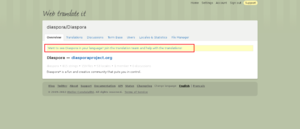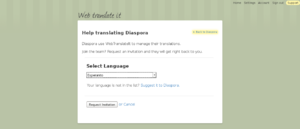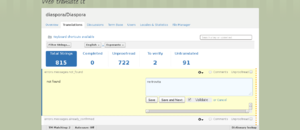Contribute translations
Tools used to translate
WebTranslateIt




We use WebTranslateIt to manage translation.
There are two projects for Diaspora on WebTranslateIt.
- diaspora/Diaspora for translating the software.
- diaspora/Website for translating diasporafoundation.org.
If you want to contribute to translation, you need to register to WebTranslateIt.
- First go to WebTranslateIt and create/sign-in to your account.
- Then go to the project site for Diaspora and/or the project site for diasporafoundation.org and join the team.
- Choose your language or suggest a new one and request an invitation.
- You'll receive an email containing a link to accept your invitation. Once you have gotten the mail and clicked on the link you'll see something like this:
- After you accepted it you can click on the "Translations" tab and start translating.
Github
Some languages are not handled inside WebTranslateIt. You will need to use Github and open a pull request to contribute to those.
diaspora/diaspora
I want to add a new language to diaspora*!
First look if you could find an existing translation.
If you have to create a new one inform a project manager so that they create the new language for you. As soon as the new language was created you can start translating.
General notes
Languages with high inflection and grammar different to English
We integrated the awesome extensions siefca made for Rails and the i18n gem: i18n-inflector and i18n-inflector-rails. Based on what the user has written into the gender field and our definitions the gender is guessed. Look at the readme of i18n-inflector for more documentation on how to use them. You can use the named patterns easily via WebTranslateIt if you want to do so. However if you want to contribute a definition please make a pull request.
Hardcoded string
There is probably some missing strings which are still untranslatable in diaspora*. If you want to fix those feel free, but only add the new key to en.yml/devise.en.yml/javascript.en.yml. Or you can simply create an issue on GitHub.
Thank you for contributing!